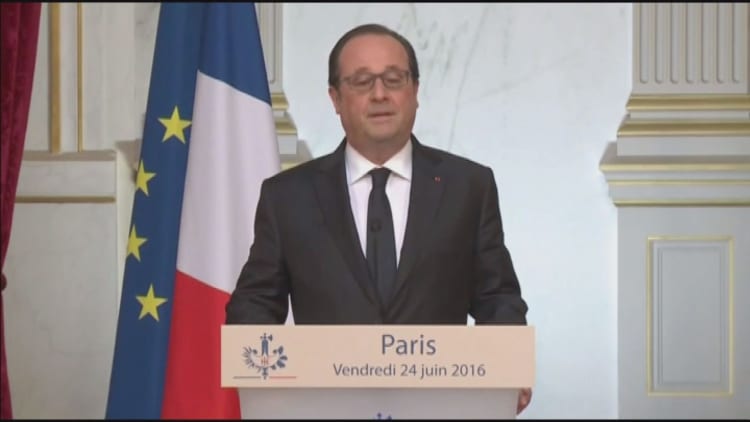Trade between the United Kingdom and the European Union is worth hundreds of billions of dollars, and businesses across Europe want it to continue uninterrupted. The sticking point: The British have made the Europeans really, really mad.
In the wake of the U.K.'s vote last week to divorce itself from the world's largest trading bloc, a debate is flaring about what commerce between the U.K. and EU should look like. On the one hand, well-entrenched business interests want it to continue with as little disruption as possible. But leaders in Europe are strongly motivated to punish the U.K. for the Brexit.
"The politics are going to be really messy," said Scott Miller, senior advisor at the Center for Strategic and International Studies, "and there's going to be an urge to punish."
The U.K. is the EU's second-biggest economy, and the fifth largest economy on earth. Its exports to the EU were worth 226.7 billion pounds ($305.7 billion) in 2014, and its imports from the bloc came in at 288.3 billion pounds ($388.7 billion) that year, according to data from the U.K.'s Office for National Statistics.
Big European companies don't want to lose the U.K. as a market, but their worries run deeper than that. EU trade rules make it possible for firms that make complex products — automakers, aircraft manufacturers, chemical companies and the like — to source components from multiple countries at once. They don't want to see that system begin to fall apart, because it would force them to redesign very complicated supply networks.
The German Association of the Automotive Industry, the trade group that represents Volkswagen, BMW, Audi and others, was already voicing its worries on the Friday following the Brexit vote.
Declaring that it would be in "nobody's interest to make the international flow of goods more expensive," the association said in a statement that German car companies operate roughly 100 facilities in the U.K., a number that has risen 30 percent since 2010. The U.K. automobile market reached an all-time record volume of 2.6 million new cars in 2015, and half of them were German.
The U.K. wants to hold onto those trade relationships, too. Its government does not, however, want people from EU member states to have the right to work and live in the U.K. Prime Minister David Cameron, meeting with 27 EU heads of state Tuesday night, suggested that the EU should be flexible on the freedom of movement rule if it wants to maintain trade with the U.K..

Europe's leaders spurned that idea. French President Francois Hollande even warned that London, currently Europe's financial capital, will no longer be able to clear transactions denominated in euros after the Brexit is complete.
Cameron and others will continue to talk up the economic benefit of the relationship as it stands. But they're certain to keep running into powerful — and sometimes bitter — political pushback from European leaders.
A punitive instinct toward the British is now being felt by many regular Europeans as well. Politicians are aware of that, and many will feel compelled to punish the U.K. in order to please domestic voters. Moreover, Brussels feels strongly that it must make an example of the British so that no other EU nations feel tempted to follow suit.
Article 50, which would kick off a parting of ways, has not yet been triggered by the U.K. government. Once it is, however, the EU will have two years to hammer out a new trade agreement.
"The EU doesn't want to make this easy," said Peter Moloney, a Boston College professor who specializes in the history of the EU and post-War economic globalization. "They don't want anyone to copy the British, and making the deal attractive is not the way to ensure that the other 27 members stay in line."
And, Moloney said, the inflammatory anti-Europe rhetoric that came out of Britain's pro-leave camp before the referendum doesn't help.
"It's awkward," he said, "because you've got this one family member who's gone on a drunken tirade against the rest of the family, and now they're wondering, 'What do we do now?'"


